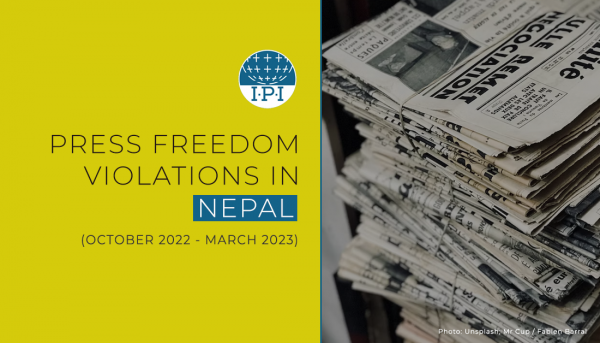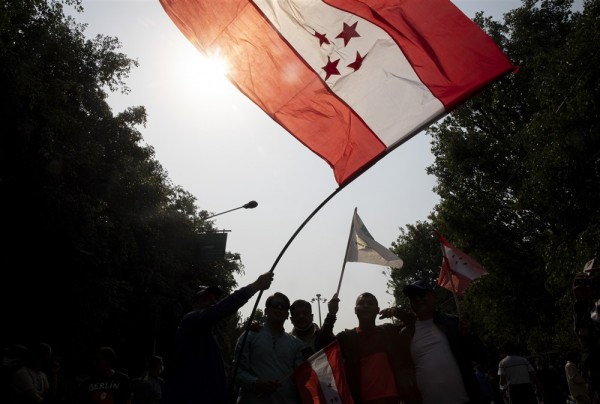The International Press Institute (IPI), the global network of editors, media executives and leading journalists dedicated to the furtherance and safeguarding of press freedom, welcomes recent commitments made by both the Nepalese government and the leadership of the Communist Party of Nepal (CPN-Maoist) to respect the right to press freedom.
Over the past eight years, the media have been caught in the ongoing conflict between the government forces and CPN-Maoist rebels. Throughout this period, journalists have been constantly hindered from carrying out their profession freely and safely.
On 27 September, IPI was informed by members of its Nepalese National Committee, that, in a letter addressed to the Federation of Nepalese Journalists (FNJ) on 10 September, Maoist leader Krishna Bahadur Mahara assured the FNJ of his party’s commitment to press freedom and said that the central leadership had directed their cadres to leave the journalists alone. Mahara’s commitments came in response to an ultimatum that the FNJ issued after the murder of journalist Dekendra Raj Thapa by the Maoists on 11 August 2004. The FNJ had threatened to boycott all Maoists-related news if the Maoists failed to state clearly their position on freedom of expression, especially the way they viewed the media.
In response to the FNJ, Mahara said that his party had no policy of attacking or persecuting journalists and indicated that all attacks on the media by the rebels were aberrations. He also insisted that reporters were free to move and report from any region, provided they obtained the necessary permission from the local Maoist leaders for such visits and made the visits under the CPN-Maoists’ supervision.
The Nepalese government has also repeatedly committed itself to the constitutional right to press freedom. This was reiterated early this year, when a police inspector and an army major signed Nepal’s first press jacket as a symbolic commitment to press freedom. The jackets were distributed by the Nepal Federation of Photo Journalists to press photographers, who face even greater dangers than news reporters.
Since 1996, CPN-Maoist rebels have been waging a “people’s war” aimed at abolishing the monarchy and establishing a republican state. Journalists have been harassed, detained, arrested and even killed by both sides in the conflict, making their working conditions extremely hard and dangerous. According to IPI information, three journalists were killed in Nepal since the beginning of the year: two of them, Padme Raj Devkota and Badri Khadka, by security forces and one, Radio Nepal Journalist Dekendra Raj Thapa, by Maoist rebels. CPN-Maoists sources also claimed that security forces killed journalist Nand Kumar Thapa on 15 September. The accusation, however, has yet to be confirmed. Both Badri Khadka and Nand Kumar Thapa were reporters for the pro-Maoist weekly, Janadesh.
On 18 August, members of the IPI Nepal National Committee participated in a peace rally in Kathmandu, protesting the killing of Dikendra Raj Thapa and the violence against journalists in the country. The IPI Nepal National Committee also donated Rs 15,000 (approx. US$ 200) to Thapa’s family.
IPI urges Nepal’s security forces and CPN-Maoists to live up to their commitments and to do everything in their power to stop all forms of attacks on the media.
“We welcome the statements made by representatives of the Nepalese government and the CPN-Maoist,” said IPI Director, Johann P. Fritz. “Such commitments show that they acknowledge the importance of safeguarding press freedom during a time of conflict. However, we are still looking forward to seeing positive steps taken by all parties to stop the attacks on journalists and to end the impunity apparently enjoyed by the perpetrators.”
As stated in the Geneva Convention relative to the Protection of Civilian Persons in Time of War and in its two additional Protocols relating to the Protection of Victims of International (Protocol 1) and Non-International (Protocol 1) Armed Conflicts, journalists are part of the civilian population and should therefore be protected as such under these international treaties.
Furthermore, Fritz said, “Nepal has adhered in 1991 to the UN International Covenant of Civil and Political Rights (CCPR), and is therefore bound to respect the right to freedom of expression and press freedom.”


